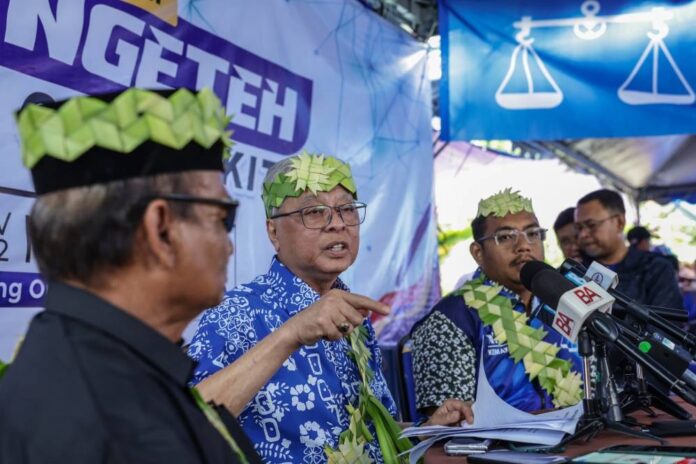Caretaker prime minister Datuk Seri Ismail Sabri Yaakob speaks to the media after attending the ‘Moh Ngeteh’ programme at the Kampung Bongok Orang Asli settlement in Bera, November 11, 2022. — Bernama pic
Follow us on Instagram, subscribe to our Telegram channel and browser alerts for the latest news you need to know.
BERA, Nov 11 — The 14.2 per cent growth in Malaysia’s gross domestic product (GDP) in the third quarter of this year from a year earlier is proof of the government’s success in driving economic recovery efforts following the Covid-19 pandemic, caretaker prime minister Datuk Seri Ismail Sabri Yaakob said.
He said this also disproved claims that the government had failed to bring about positive changes to the economy.
The strengthening GDP, Ismail Sabri said, was driven by the reopening of economic sectors in tandem with the transition to endemic phase that has encouraged private consumption and the labour market.
“The 14.2 per cent growth is more rapid than the 8.9 per cent recorded in the second quarter and five per cent in the first.
“The same goes with the unemployment rate which has fallen to 3.6 per cent in September, compared to 4. 6 per cent in August last year (when he was appointed prime minister),” he told reporters after attending the “Moh Ngeteh” programme at the Kampung Bongok Orang Asli settlement here today.
In addition, he said consumer confidence was reflected in wholesale and retail trade sales reaching RM134 billion for September this year.
“The business sector is emerging stronger with manufacturing sector sales in September 2022 amounting to RM161.7 billion, which is a 19.5 per cent increase compared to September 2021.
“The government is constantly monitoring developments in the global economy to ensure that the major impact of the economic slowdown does not affect the country,” he said.
Earlier, Bank Negara Malaysia (BNM) governor Tan Sri Nor Shamsiah Mohd Yunus announced that Malaysia’s economy grew by 14.2 per cent in the third quarter of this year.
She said the growth was driven by continued expansion in domestic demand, a strong recovery in the labour market, robust electrical and electronics (E&E) and non-E&E products export and continuous policy support. — Bernama



